

Positieve psychologie. Vijf pijlers van positieve organisatiepsychologie Het onderwerp van de positieve organisatiepsychologie is bevlogenheid en gelukkig werken.
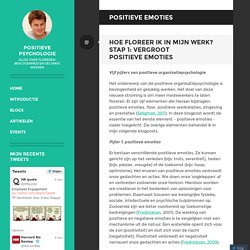
Het doel van deze nieuwe stroming is om meer medewerkers te laten floreren. Er zijn vijf elementen die hieraan bijdragen: positieve emoties, flow, positieve werkrelaties, zingeving en prestaties (Seligman, 2011). Kijken naar de kern by Annemieke Legters on Prezi. Career - Positive Psychology. Live Happy Magazine. Gelukkig werken in het onderwijs. Een artikel uit 'expertise', praktisch visieblad voor hoger onderwijs, door Francine ten Hoedt.

‘Positieve psychologie kun je gebruiken op alle terreinen van het leven. Je kunt er de hele dag mee bezig zijn. Er wordt vaak gedacht dat positieve psychologie alleen maar ‘leuk’ is. Dat is niet zo.' Positieve psychologie is hard werken Onno Hamburger is trainer bij Van Harte & Lingsma, maar bovenal is hij de gelukscoach van Nederland. ‘Het is zo bijzonder,’ vertelt hij enthousiast, ‘organisaties staan steeds meer open om na te denken over geluk op het werk. Menig initiatiefnemer met een goed idee zal jaloers kijken naar de snelheid waarmee je je gedachtegoed hebt overgebracht. Positive psychology. Return to Main page.
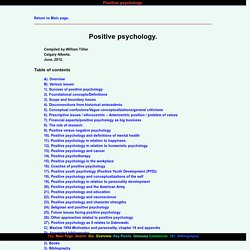
Compiled by William Tillier Calgary Alberta. June, 2012. Table of contents Return to top A). Several early contributions to positive psychology were important including works by Jahoda (1958) and Maslow (1954). Seligman introduced positive psychology as "a movement" during his term as president of the APA in 1998. Positive psychology has been extremely successful on a number of fronts including over 1000 publications, numerous special issues, numerous handbooks, etc.
Psychological concerns with happiness did not originate with Seligman. It appears that from its inception, positive psychology has been plagued by a number of inherent and significant problems. Seligman and Csikszentmihalyi criticized popular psychology and the various "unscientific" applications and self–help movements that developed as spinoffs of humanistic psychology. NLP in het onderwijs. Using the new Positive Psychology.
Teaching Well-Being in SchoolsThe following is an excerpt from Flourish: A Visionary New Understanding of Happiness and Well-Being First, a quiz: Question one: in one or two words, what do you most want for your children?
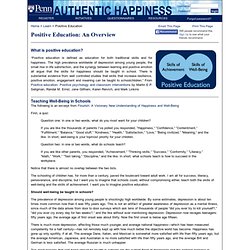
If you are like the thousands of parents I’ve polled you responded, “Happiness,” “Confidence,” “Contentment,” “Fulfillment,” “Balance,” “Good stuff,” “Kindness,” “Health,” “Satisfaction,” “Love,” “Being civilized,” “Meaning,” and the like. In short, well-being is your topmost priority for your children.Question two: in one or two words, what do schools teach? Hetkind. Positive education: Creating flourishing students, staff and schools. By Dr Suzy Green MAPS, Coaching Psychology Unit, University of Sydney, and Positive Psychology Institute, Dr Lindsay Oades, Director, Australian Institute of Business Well-Being, University of Wollongong, and Paula Robinson, Positive Psychology Institute This article provides an introduction to the field of ‘positive education' and demonstrates how applied positive psychology, which includes evidence-based coaching, can inform and assist schools to develop and maintain the optimal functioning of students and staff.
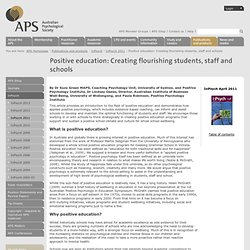
We encourage those working in or with schools to think strategically in creating positive education programs that support and sustain a positive school climate and culture for whole school wellbeing. Waarom positief onderwijs. Positive education. Theoretical approaches[edit] Maria Montessori, the originator of the Montessori system, put forth views relating to positive schooling as well.
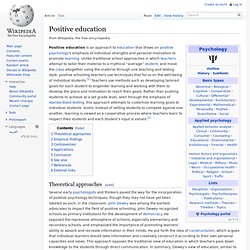
The Montessori system is largely based on the positive psychology principle of creativity. Creativity, known as one of the twenty-four character strengths,[4] is offered with the freedom for children to choose how they learn, known as self-directed learning. Children are provided with hands-on materials, which not only inspires creativity, but also stimulates interest in learning, as children are able to express themselves through learning, rather than feeling forced to work in order to learn.[5] Elizabeth Hurlock was one of the first psychologists to actually carry out experiments with positive psychology techniques to measure the effects of positive schooling in the field of education. Jeniffer Henderlong and Mark Lepper echo Hurlock's arguments that praise is beneficial to enhancing children's intrinsic motivation.
Empirical findings[edit] Via-character-strengths. Positive Attitude Matters. Know the feeling?
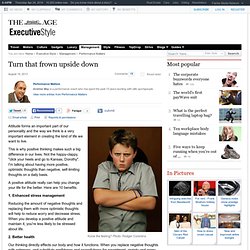
Photo: Rodger Cummins Attitude forms an important part of our personality and the way we think is a very important element in creating the kind of life we want to live. This is why positive thinking makes such a big difference in our lives. Not the happy-clappy, "click your heels and go to Kansas, Dorothy". I'm talking about having more positive, optimistic thoughts than negative, self-limiting thoughts on a daily basis. A positive attitude really can help you change your life for the better. 1.
Advertisement Reducing the amount of negative thoughts and replacing them with more optimistic thoughts will help to reduce worry and decrease stress. 2. Our thinking directly effects our body and how it functions. 3. Having self-confidence means that we have faith in our capacities. 4. Optimists are better decision makers. 5. A silent mind enables us to gain focus and tap inner inspiration. 6. 7.